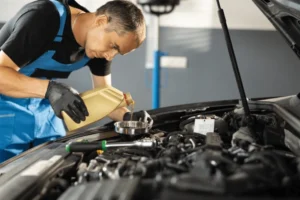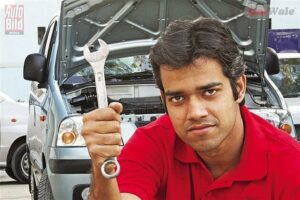DIY car repairs can be both exciting and rewarding; however, before embarking on such an endeavor it’s essential to carefully consider all costs and safety considerations before making a decision.

Many car owners appreciate the satisfaction that comes from performing DIY car maintenance tasks themselves, such as changing oil or replacing burned-out bulbs. DIY projects allow car owners to complete projects at their own pace and schedule, offering freedom and flexibility when working towards maintaining their vehicles.
Cost of Parts
DIY car service can be an economical and efficient way to save money on auto repair, particularly basic maintenance tasks. But you must carefully consider the costs of tools and parts needed for repair as well as any risk involved with performing a DIY project that might go awry, which may lead to more expenses or frustration than anticipated.
DIY projects can be rewarding experiences that provide both learning and a sense of achievement, yet can also be dangerous and time-consuming if you lack experience repairing vehicles. Furthermore, your lack of expertise could result in mistakes being made along the way and cause delays that prevent you from having access to your car for an extended period.
Professional mechanics possess extensive training and experience that allow them to quickly diagnose issues and make repairs, safely. Furthermore, most mechanics offer warranties on services and parts so you can have peace of mind should anything go wrong during repairs; DIY attempts could void your warranty so if complex or safety-critical repairs need doing you should always seek professional advice first.
Cost of Labor
When your car needs repairs, it can be challenging deciding between DIYing the job yourself or hiring professional services. Going the DIY route may save money while providing a sense of accomplishment and teaching new skills – however it is essential that you assess its complexity, time and tools required, safety concerns before making a final decision.
Cost Savings
DIY auto repairs offer potential cost savings through eliminating labor costs, particularly for basic maintenance tasks like changing oil. But be wary: any mistakes made during repair could cause more costly and extensive issues down the line; additionally, DIY often voids warranties and makes this solution less cost-effective than alternative options.
Before undertaking any DIY repairs on your own, it’s essential to carefully assess your skill level, availability of tools and space as well as safety concerns. If you possess a solid understanding of the vehicle you intend to work on as well as proper repair techniques then DIY may be right for you; however complex mechanical repairs or safety-critical components should be left to professionals.
Time
When it comes to maintaining and repairing your vehicle, two methods exist for saving both time and money: DIY projects are time- and cost-saving options while professional mechanics offer more comprehensive repairs that often include safety considerations. Both approaches have their own distinct advantages: DIY offers new skills development as well as the sense of accomplishment when finished; but when complex or safety-related repairs need attention it may be best left in their hands.
Oil changes are generally straightforward tasks that most people can complete themselves and save money compared to having it done by a mechanic. But without proper tools or experience, the task could take much longer and be much more inconvenient for you.
Professional auto repair shops also utilize advanced tools and diagnostic equipment that enable them to identify and fix issues quickly and precisely, saving both time and frustration while also helping prevent costly mistakes. It may be wise to reach out for assistance if your car is still covered under its manufacturer’s warranty, as attempting DIY repairs could void that warranty altogether.
Safety
DIY car repairs and maintenance projects can be an exciting way to learn the mechanics of your vehicle and gain independence, but before beginning any auto repair project it is vitally important that safety issues be taken into consideration first. A few simple precautions will ensure you work safely while protecting the integrity of your car from accidental damages.
Professional mechanics are well-trained to follow strict codes of conduct and undergo regular inspections, making them more likely to complete accurate repairs on their first try than DIYers who may make errors due to misdiagnosing problems or purchasing the wrong parts. Such mistakes could cost a great deal over time.
DIY car repairs can void a warranty, creating additional problems for drivers who rely on their car to access work or run household errands. This could become particularly irksome in cases of drivers needing their vehicle for essential transportation needs like work commutes.
DIY auto repair can be an excellent way to explore your car and gain independence, but for complex repairs or maintenance it is often best to entrust the experts. Professional mechanics possess extensive knowledge and high-tech equipment which enable them to quickly diagnose and fix problems; moreover they often offer warranties on their services and parts for added peace of mind for drivers attempting to avoid costly mistakes.


